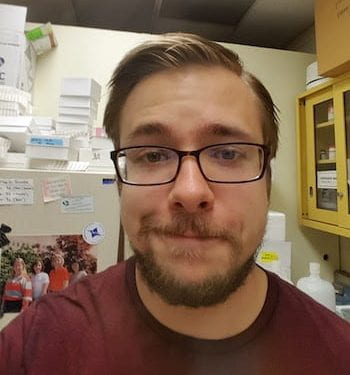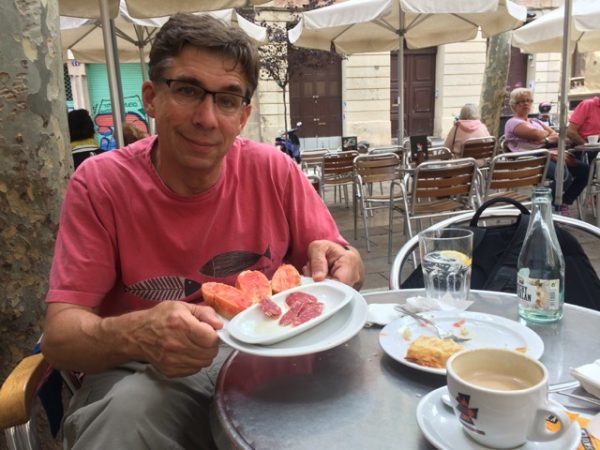Dr. Christopher Gomez (Principal Investigator)
As a physician and scientist, I have dedicated my career to the understanding and treatment of ataxia, both in the clinic and in the laboratory.
In the clinic, in addition to treating symptoms and helping patients cope and adapt to their ataxia, I have been working to learn the best ways to measure the severity of the balance and coordination problems experienced by patients with ataxia. This is very important because it will allow us to more easily test whether any newly developed drugs help symptoms or slow progression of ataxia. If successful we expect that we will entice more pharmaceutical companies to enter the field of ataxia therapy, and thus speed the development of new drugs.
In the lab our goal is to discover how mutations in ataxia genes cause SCA6 or other forms of ataxia, and to develop ways to block the effects of the gene mutations that cause SCA6. We have discovered a new protein, α1ACT, hidden in the SCA6 gene sequence that we believe is the cause of SCA6. We have decoded how this protein is turned on and are developing ways to safely turn it off, first in animal models and eventually in patients.
Dr. Xiaofei Du (Research Associate Professor)
 I received my basic biology and medical training in China and came to Chicago to further pursue my interest in genetically inheritable diseases. I have a research interest in the field of neurodegenerative disorders, especially in elucidating the connection between genetic mutation and the development of neuron degeneration. My long-term goal is to understand the pathogenic mechanisms that underlie the development of spinocerebellar ataxia and eventually to develop new therapies. I have a research background in molecular and cellular pathogenesis of endocrine syndromes. My previous fellowship and research training in genetic diseases and in the regulation of gene expression provide me with the expertise to pursue my current and future research. I also had a postdoctoral training in studying the molecular genetics of Triple A syndrome and the signal transduction pathways that link regulation of testosterone production and fat stores. After publication of this work as it related to hyperandrogenic disorders, I moved my research focus to cerebellar development and mechanisms of neurodegenerative disease, where there is similar interplay between transcription factors bearing polyglutamine tracts, development and neurodegeneration. I have discovered that CACNA1A gene, encoding a calcium channel subunit, employs a novel strategy to directly coordinate a gene expression program, and plays a newly recognized role in regulating cerebellar neuronal cell development. I also found that the second gene product of CACNA1A, α1ACT, promotes PCs morphology and cerebellum development by directly binding and regulating target genes. In the current multi-disciplinary and highly interactive environment of the field of neurodegenerative disease research, I have mastered a variety of state-of-the-art molecular biological techniques, such as protein isolation, small molecular library screening, stem cell development, next generation sequencing and system bioinformatics, as well as mouse phenotyping and electrophysiology. This knowledge, coupled with my previous training, will provide an ideal foundation on which I can build a unique and independent line of research towards a better understanding of calcium channel disorders and the pathological mechanism for neurodegenerative disease.
I received my basic biology and medical training in China and came to Chicago to further pursue my interest in genetically inheritable diseases. I have a research interest in the field of neurodegenerative disorders, especially in elucidating the connection between genetic mutation and the development of neuron degeneration. My long-term goal is to understand the pathogenic mechanisms that underlie the development of spinocerebellar ataxia and eventually to develop new therapies. I have a research background in molecular and cellular pathogenesis of endocrine syndromes. My previous fellowship and research training in genetic diseases and in the regulation of gene expression provide me with the expertise to pursue my current and future research. I also had a postdoctoral training in studying the molecular genetics of Triple A syndrome and the signal transduction pathways that link regulation of testosterone production and fat stores. After publication of this work as it related to hyperandrogenic disorders, I moved my research focus to cerebellar development and mechanisms of neurodegenerative disease, where there is similar interplay between transcription factors bearing polyglutamine tracts, development and neurodegeneration. I have discovered that CACNA1A gene, encoding a calcium channel subunit, employs a novel strategy to directly coordinate a gene expression program, and plays a newly recognized role in regulating cerebellar neuronal cell development. I also found that the second gene product of CACNA1A, α1ACT, promotes PCs morphology and cerebellum development by directly binding and regulating target genes. In the current multi-disciplinary and highly interactive environment of the field of neurodegenerative disease research, I have mastered a variety of state-of-the-art molecular biological techniques, such as protein isolation, small molecular library screening, stem cell development, next generation sequencing and system bioinformatics, as well as mouse phenotyping and electrophysiology. This knowledge, coupled with my previous training, will provide an ideal foundation on which I can build a unique and independent line of research towards a better understanding of calcium channel disorders and the pathological mechanism for neurodegenerative disease.
Dr. Ahmed Sidky (Post-Doctoral Scholar)

My name is Ahmed Mokhtar Sidky, I received my bachelor’s degree in chemistry science, then got a master’s of Biochemistry from Minia University, Egypt. After that, I received Newton-Mosharafa PhD scholarship to study molecular genetics at the university of Glasgow, UK where I studied the molecular dynamics of the CAG•CTG trinucleotide repeat expansion-mediated SCAs by means of NGS. My work here in Gomez lab is to study the Age-dependent molecular and cellular mechanisms associated the SCA6 disease. Also, I’m trying to figure out the transcriptional signature of SCA6 by means of snRNA sequencing. I like music, movies and soccer, my favourite championship is the English premier league.
Tyler Thaxton (PhD Student)
 I grew up in Canton, Ohio and attended (THE) Ohio State University where I earned a B.S. in Neuroscience and Psychology. I then moved to Chicago to work as a lab technician at Northwestern University and matriculated at University of Chicago soon after. My previous research experience includes studies on rehabilitation after spinal cord injury, the inflammatory microenvironment after spinal cord injury, and investigating therapeutics for epilepsy and Dravet Syndrome. I started working in the lab in 2020 with my focus mainly on calcium channelopathies. In my free time I enjoy playing board games, reading, and cooking.
I grew up in Canton, Ohio and attended (THE) Ohio State University where I earned a B.S. in Neuroscience and Psychology. I then moved to Chicago to work as a lab technician at Northwestern University and matriculated at University of Chicago soon after. My previous research experience includes studies on rehabilitation after spinal cord injury, the inflammatory microenvironment after spinal cord injury, and investigating therapeutics for epilepsy and Dravet Syndrome. I started working in the lab in 2020 with my focus mainly on calcium channelopathies. In my free time I enjoy playing board games, reading, and cooking.
Eric Gama (Research Technician)
 I am a recent graduate from the University of Illinois at Urbana-Champaign. I studied Molecular and Cellular biology and did most of my undergraduate research in crop sciences. I am interested in the potential of gene manipulation in developing solutions to issues such as malnutrition, food insecurity and, now, human disease. Switching from crop sciences to neurology was an important step in tailoring my experiences for the medical field, adding behavior measures and clinical relevance to my research experience. I would also like to see how similar concepts overlap in finding solutions to improving human health, whether it be disease or food availability.
I am a recent graduate from the University of Illinois at Urbana-Champaign. I studied Molecular and Cellular biology and did most of my undergraduate research in crop sciences. I am interested in the potential of gene manipulation in developing solutions to issues such as malnutrition, food insecurity and, now, human disease. Switching from crop sciences to neurology was an important step in tailoring my experiences for the medical field, adding behavior measures and clinical relevance to my research experience. I would also like to see how similar concepts overlap in finding solutions to improving human health, whether it be disease or food availability.

